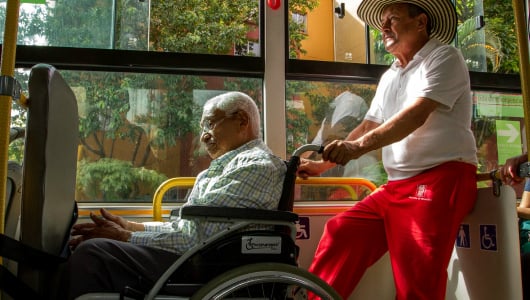The worst disability is when you do not want to do something,” said Giovany Higuita, one of METRO’s educational guides, when he was showing how to use the electrical-mechanic platforms and elevators that the Municipality of Medellín and Empresa de Transporte Masivo del Valle de Aburrá Limitada (METRO) placed at the disposition of nearly 12,000 disabled persons in 2007.
With this type of action, incompliance with its ethical and social responsibility principles as well as with national laws and regulations, METRO started conditioning its stations to make them accessible to persons with reduced mobility. This vision became a way of returning hope to the people of the region bent on proving to society that people with physical disabilities are also worthy of inclusion and respect.
From this perspective, disability is understood as a question of human rights issue that will not stand for any discrimination or social, economic or physical limitations regarding accessibility. Therefore, in the Metropolitan Transit System accessibility is not seen as an isolated topic but instead as part of the connected, articulated, continuous transportation network, which enables all users to enjoy the public spaces and conceive the Metropolitan Transit System culture as being truly collective.
After installing electromechanical mobile platforms, ramps, sloped walkways, signaling and elevators in 96% of the stations, the Metropolitan Transit System went from having an ideal for accessibility to accessibility becoming a reality. The Company further closed the gaps by implementing new technologies, such as the CÍVICA no contact card.
Social sensitization and instructions operations have been key to the development and implementation of the new technologies, pursuant to the Company’s Master Plan “Trust in the Future” 2006-2030. In this process, persons with some type of disability have been the educational promoters of this entire transformation, and they play the role of peer educational multipliers; in addition, they offer information training to users on how to assist persons with limited mobility. During a normal work day in direct contact with PRM users, educational promoters have oriented their peers concerning the use, care, and operation of the elevators, electromechanical platforms, and the no contact card. This process has proven to be an opportunity for some young people who had never had a job before; they have proven in a humane manner that they can be and are useful to society.

Metro de Medellín’s rapproachment with disabled persons has given the Company the opportunity to disseminate its projects and actions to educational groups, entities that enable persons with reduced mobility to get together, older adults, and official agencies that look after the wellbeing of this population in Valle de Aburrá.
To do so, accompaniment by different associations, such as Amigos de los Limitados Físicos, and participation in the Productivity Pact –an initiative aimed at improving work opportunities for disabled persons and at contributing to their economic and social inclusion through alliances with the business sector–, are and will continue to be essential for discussing relevant topics, such as the classification of disabilities, minimum safety conditions for disabled persons, myths and truths about disability, handling, and relations, among others.
In addition to being a great advance from the point of view of innovation, this process of sensitization and socialization with disabled persons represents vindication for physical and structural omissions in the past and a new meeting of social inclusion and a better quality of life in the present.




